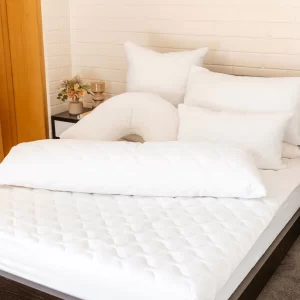The Ultimate Guide to Bedding and Protectors for Asthma and Allergy Sufferers

Introduction: Article: The Ultimate Guide to Bedding and Protectors for Asthma and Allergy Sufferers. By Cover and Protect
For those who suffer from asthma and allergies, a good night’s sleep can sometimes feel elusive. Dust mites, pet dander, pollen, and other allergens can wreak havoc on respiratory systems, leading to restless nights and compromised health. However, with the right bedding and protectors, individuals can create a safe and comfortable sleep environment conducive to better rest and improved health. In this comprehensive guide, we will explore the best bedding options and protectors specifically designed for asthma and allergy sufferers, providing insights into materials, features, and tips for selecting the most suitable products.
Understanding Asthma and Allergies:
Before delving into bedding solutions, it’s essential to understand the triggers that can exacerbate asthma and allergies. Asthma is a chronic respiratory condition characterized by inflammation and narrowing of the airways, often triggered by allergens such as dust mites, pollen, pet dander, and mould. Allergies, on the other hand, occur when the immune system overreacts to certain substances, leading to symptoms like sneezing, itching, nasal congestion, and wheezing.
In the bedroom, common allergens accumulate in bedding materials, including pillows, mattresses, and sheets, making it crucial to invest in hypoallergenic options that provide a barrier against these triggers.
Choosing the Right Bedding Materials:
When selecting bedding for asthma and allergy sufferers, the choice of materials plays a pivotal role in reducing exposure to allergens and promoting a healthier sleep environment. Here are some of the best bedding materials recommended for individuals with asthma and allergies:
- Organic Cotton: Organic cotton is grown without the use of synthetic pesticides or fertilizers, making it an excellent choice for those with sensitive skin and respiratory issues. Organic cotton bedding is soft, breathable, and naturally hypoallergenic, reducing the risk of irritation and allergic reactions.
- Bamboo: Bamboo bedding is prized for its hypoallergenic and moisture-wicking properties. Bamboo fibers are naturally resistant to dust mites and mold, making them ideal for individuals prone to allergies and asthma. Additionally, bamboo sheets are luxuriously soft and environmentally friendly, as bamboo is a highly sustainable crop.
- Tencel/Lyocell: Tencel, also known as Lyocell, is a fabric made from wood pulp, often sourced from eucalyptus trees. Tencel bedding is renowned for its silky-smooth texture, moisture-wicking abilities, and resistance to allergens. The production process involves environmentally friendly methods, making Tencel an eco-conscious choice for bedding.
- Hypoallergenic Wool: Contrary to popular belief, hypoallergenic wool can be an excellent bedding option for asthma and allergy sufferers. High-quality wool is naturally resistant to dust mites, mould, and mildew, thanks to its inherent moisture-wicking and antimicrobial properties. Merino wool, in particular, is prized for its softness and breathability, making it suitable for all seasons.
- Silk: Silk bedding offers luxurious comfort while providing a natural barrier against allergens. Silk is hypoallergenic, resistant to dust mites, and effectively regulates temperature, keeping users cool in summer and warm in winter. Silk pillowcases, in particular, are beneficial for individuals with asthma and allergies, as they reduce friction and minimize skin irritation.
Understanding Mattress Protectors:
In addition to choosing the right bedding materials, investing in quality mattress protectors is essential for asthma and allergy sufferers. Mattress protectors act as a barrier against dust mites, bed bugs, bacteria, and spills, prolonging the lifespan of the mattress while safeguarding against allergen accumulation. When selecting mattress protectors, consider the following factors:
- Allergen Barrier: Look for mattress protectors specifically designed to block allergens, such as dust mites and pet dander. Encasement-style protectors with zipper closures provide complete coverage and prevent allergens from penetrating the mattress.
- Breathability: Opt for breathable mattress protectors that allow air to circulate freely, preventing heat and moisture build up. Breathable fabrics like cotton, bamboo, and Tencel promote a cooler, more comfortable sleep environment while reducing the risk of mould and mildew growth.
- Waterproofing: If allergies are exacerbated by moisture, choose mattress protectors with waterproof or water-resistant properties. These protectors are particularly beneficial for individuals prone to night sweats, bedwetting, or spills, as they prevent liquids from seeping into the mattress and causing mould or mildew growth.
- Hypoallergenic Materials: Select mattress protectors made from hypoallergenic materials to minimize the risk of allergic reactions. Hypoallergenic fabrics like polyester microfiber, polyurethane, and vinyl are commonly used in mattress protectors and offer superior protection against allergens.
- Ease of Maintenance: Choose mattress protectors that are easy to clean and maintain. Machine-washable protectors can be conveniently laundered to remove dust, dirt, and allergens, helping to keep the sleep environment clean and hygienic.
Top Picks for Bedding and Protectors:
Now that we’ve explored the key considerations for selecting bedding and protectors for asthma and allergy sufferers, let’s highlight some top picks available on the market:
- Organic Cotton Sheets and Pillowcases: Brands like Boll & Branch and Coyuchi offer a wide range of organic cotton bedding, including sheets, pillowcases, and duvet covers. Their products are made from certified organic cotton, free from harmful chemicals and dyes, providing a safe and comfortable sleep experience for individuals with asthma and allergies.
- Bamboo Bedding Sets: Cariloha and Ettitude are renowned for their bamboo bedding collections, featuring sheets, pillowcases, and comforters. Their bamboo fabrics are hypoallergenic, moisture-wicking, and eco-friendly, making them an excellent choice for allergy-prone individuals seeking sustainable bedding options.
- Tencel/Lyocell Bedding Ensembles: Malouf and Nest Bedding offer Tencel bedding sets known for their softness, breathability, and allergen-resistant properties. Tencel fibers are derived from sustainably sourced wood pulp and processed using environmentally friendly methods, making them a preferred choice for eco-conscious consumers with asthma and allergies.
- Hypoallergenic Wool Mattress Toppers: Sleep & Beyond and Holy Lamb Organics produce high-quality wool mattress toppers designed to provide additional comfort and protection. Their wool toppers are naturally hypoallergenic, temperature-regulating, and resistant to dust mites, offering relief to allergy sufferers while enhancing sleep quality.
- Silk Pillowcases and Eye Masks: Slip and Lily Silk are renowned for their luxurious silk pillowcases and eye masks, perfect for individuals with sensitive skin and respiratory issues. Silk is naturally hypoallergenic, gentle on the skin, and resistant to allergens, making it an ideal choice for asthma and allergy sufferers seeking indulgent sleep accessories.
Conclusion:
Creating a conducive sleep environment is essential for managing asthma and allergies and promoting overall well-being. By investing in high-quality bedding materials and protectors specifically designed for allergy sufferers, individuals can reduce exposure to allergens.

